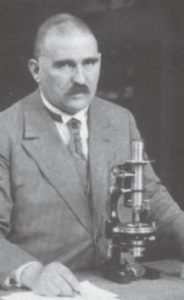Greatest Mathematician of All Time
 Amalie Emmy Noether (1882-1935) was born in Bavaria, Germany to a wealthy Jewish family, the eldest daughter of renowned mathematician Max Noether. She enjoyed learning languages and eventually passed a test allowing her to teach English and French. Instead, she decided to further her studies at the University of Erlangen. Female students were not allowed, but Noether was given permission to audit lectures along with one other woman. In 1903, restrictions were eased and Noether passed the graduation exam, after which she enrolled at the University of Gottingen to study astronomy and mathematics. She returned to Erlangen and taught math for seven years—without pay! During this time, she published several ground-breaking papers. In 1915, Noether was invited back to Gottingen, and when an uproar arose about how men could be subjected to learn “at the feet of a woman”, the university responded: “We are a university, not a bathhouse.” In 1918, Noether silenced critics by proving what is now called Noether’s Theorem, which was said to be “one of the most important mathematical theorems ever proved in guiding the development of modern physics, possibly on a par with the Pythagorean theorem”. The following year, she was granted tenure, and then a professorship. Among her many revolutionary achievements, Noether is most famous for mathematical rings, chain conditions, and abstract algebra—which some say is her greatest contribution to math and science. Thanks to Noether and the brilliant minds she attracted and taught, the University of Gottingen became the pre-eminent math institution in the world. She supervised the work of a dozen graduate students who became world-famous mathematicians in their own right. Noether was famous for living simply and modestly, not caring at all about her appearance, talking quickly, and teaching freely with no lesson plans. In 1932, she received the prestigious Ackermann–Teubner Memorial Award for math. The following year, the Nazis came to power and she was fired from her position. Undeterred, Noether continued to teach from her apartment. Soon, the Rockefeller Foundation arranged for her a position in the United States, and Noether went on to teach at Bryn Mawr College, as well as at Princeton (alongside fellow Jewish refugee Albert Einstein). Tragically, Noether passed away suddenly after surgery to remove an ovarian tumour. She was eulogized as “the greatest woman mathematician who has ever lived; and the greatest woman scientist of any sort…” There are numerous awards, concepts, streets and schools named after her around the world (including a math institute at Bar-Ilan University in Israel), as well as a satellite, a crater on the moon, and even a distant planet.
Amalie Emmy Noether (1882-1935) was born in Bavaria, Germany to a wealthy Jewish family, the eldest daughter of renowned mathematician Max Noether. She enjoyed learning languages and eventually passed a test allowing her to teach English and French. Instead, she decided to further her studies at the University of Erlangen. Female students were not allowed, but Noether was given permission to audit lectures along with one other woman. In 1903, restrictions were eased and Noether passed the graduation exam, after which she enrolled at the University of Gottingen to study astronomy and mathematics. She returned to Erlangen and taught math for seven years—without pay! During this time, she published several ground-breaking papers. In 1915, Noether was invited back to Gottingen, and when an uproar arose about how men could be subjected to learn “at the feet of a woman”, the university responded: “We are a university, not a bathhouse.” In 1918, Noether silenced critics by proving what is now called Noether’s Theorem, which was said to be “one of the most important mathematical theorems ever proved in guiding the development of modern physics, possibly on a par with the Pythagorean theorem”. The following year, she was granted tenure, and then a professorship. Among her many revolutionary achievements, Noether is most famous for mathematical rings, chain conditions, and abstract algebra—which some say is her greatest contribution to math and science. Thanks to Noether and the brilliant minds she attracted and taught, the University of Gottingen became the pre-eminent math institution in the world. She supervised the work of a dozen graduate students who became world-famous mathematicians in their own right. Noether was famous for living simply and modestly, not caring at all about her appearance, talking quickly, and teaching freely with no lesson plans. In 1932, she received the prestigious Ackermann–Teubner Memorial Award for math. The following year, the Nazis came to power and she was fired from her position. Undeterred, Noether continued to teach from her apartment. Soon, the Rockefeller Foundation arranged for her a position in the United States, and Noether went on to teach at Bryn Mawr College, as well as at Princeton (alongside fellow Jewish refugee Albert Einstein). Tragically, Noether passed away suddenly after surgery to remove an ovarian tumour. She was eulogized as “the greatest woman mathematician who has ever lived; and the greatest woman scientist of any sort…” There are numerous awards, concepts, streets and schools named after her around the world (including a math institute at Bar-Ilan University in Israel), as well as a satellite, a crater on the moon, and even a distant planet.
Words of the Week
A day will come in which the masses will be so tolerant, that the intelligent people will be forbidden to think in order not to threaten the stupid.
– Fyodor Dostoevsky


